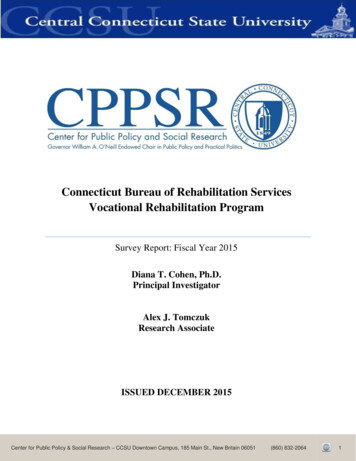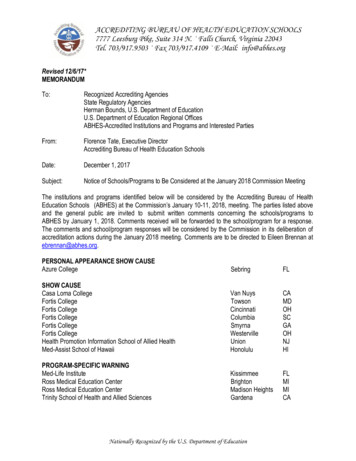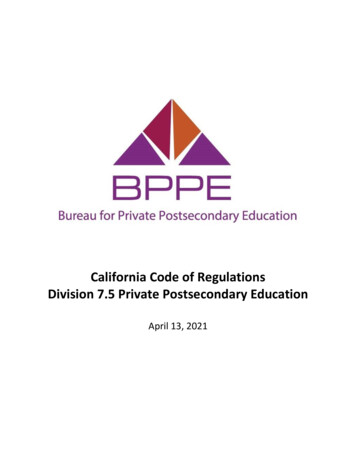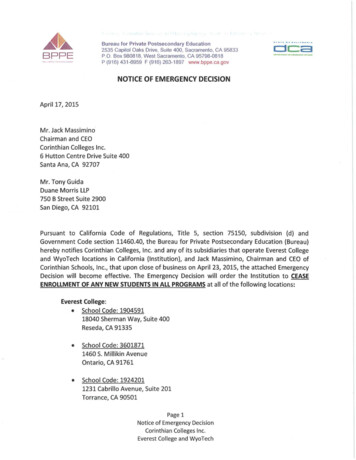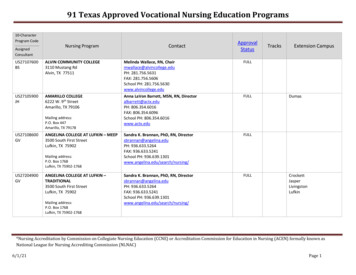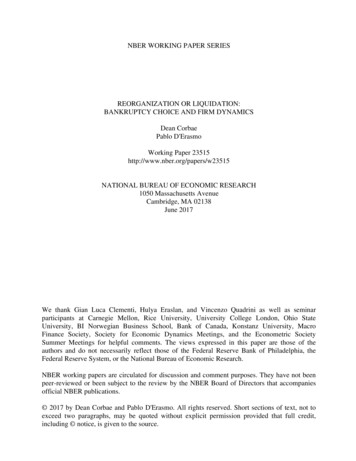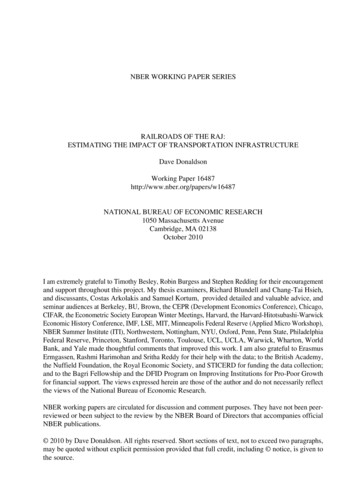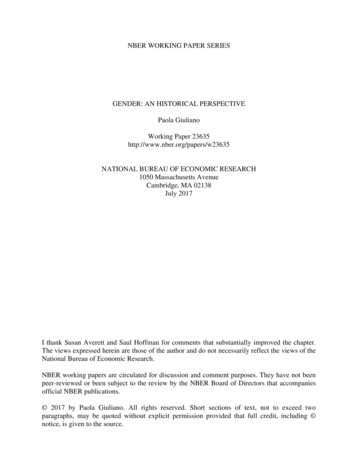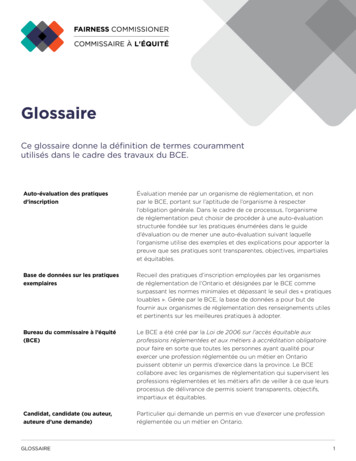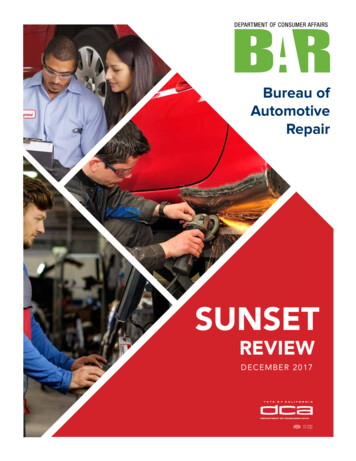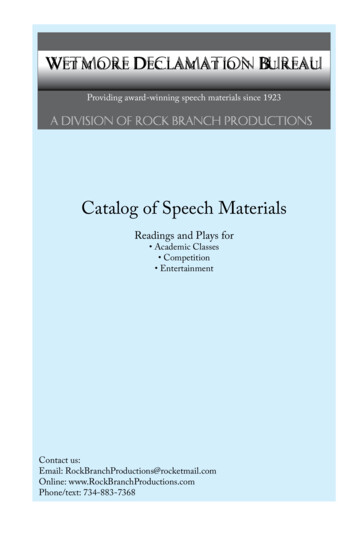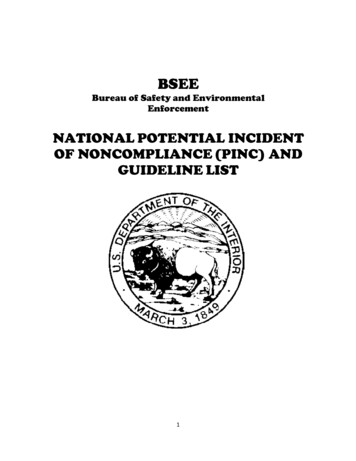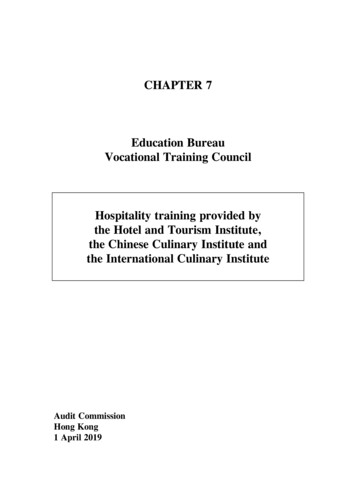
Transcription
CHAPTER 7Education BureauVocational Training CouncilHospitality training provided bythe Hotel and Tourism Institute,the Chinese Culinary Institute andthe International Culinary InstituteAudit CommissionHong Kong1 April 2019
This audit review was carried out under a set of guidelines tabled inthe Provisional Legislative Council by the Chairman of the PublicAccounts Committee on 11 February 1998. The guidelines wereagreed between the Public Accounts Committee and the Director ofAudit and accepted by the Government of the Hong Kong SpecialAdministrative Region.Report No. 72 of the Director of Audit contains 8 Chapters whichare available on our website at https://www.aud.gov.hkAudit Commission26th floor, Immigration Tower7 Gloucester RoadWan ChaiHong KongTel: (852) 2829 4210Fax: (852) 2824 2087E-mail : enquiry@aud.gov.hk
HOSPITALITY TRAINING PROVIDED BYTHE HOTEL AND TOURISM INSTITUTE,THE CHINESE CULINARY INSTITUTE ANDTHE INTERNATIONAL CULINARY INSTITUTEContentsParagraphEXECUTIVE SUMMARYPART 1: INTRODUCTION1.1– 1.12Audit review1.13General response from VTC1.14Acknowledgement1.15PART 2: MANAGEMENT OF PROGRAMMESProgramme planning2.12.2– 2.6Audit recommendation2.7Response from VTC2.8Evaluation of programme performance2.9– 2.16Audit recommendations2.17Response from VTC2.18Industrial attachment2.19 – 2.24Audit recommendations2.25Response from VTC2.26—i—
ParagraphPART 3: MANAGEMENT OF THE T HOTEL ANDTRAINING RESTAURANTSManagement of The T Hotel3.13.2– 3.17Audit recommendations3.18Response from VTC3.19Management of training restaurants and hotel lounge3.20 – 3.35Audit recommendations3.36Response from VTC3.37PART 4: ADMINISTRATIVE ISSUES4.1Campus management4.2– 4.16Audit recommendations4.17Response from VTC4.18Staff management4.19 – 4.27Audit recommendations4.28Response from VTC4.29Inventory management4.30 – 4.34Audit recommendations4.35Response from VTC4.36—ii—
AppendicesPageA : Boards and Committees on academic matters ofthe Institutes (2017/18)72B : The Institutes: Organisation chart (extract)(31 December 2018)73C : Acronyms and abbreviations74—iii—
—iv—
HOSPITALITY TRAINING PROVIDED BYTHE HOTEL AND TOURISM INSTITUTE,THE CHINESE CULINARY INSTITUTE ANDTHE INTERNATIONAL CULINARY INSTITUTEExecutive Summary1.The Vocational Training Council (VTC) provides vocational andprofessional education and training for students from post-Secondary 3 topost-Secondary 6 levels and also a diverse range of professional developmentprogrammes for people in employment. VTC provides vocational and professionaleducation services mainly through its 13 member institutions. Three of themspecialise in offering programmes on hospitality, namely: (a) the Hotel and TourismInstitute (HTI); (b) the Chinese Culinary Institute (CCI); and (c) the InternationalCulinary Institute (ICI). HTI, CCI and ICI are managed by the same managementteam and VTC monitors their income and expenditure collectively as a singleaccounting unit (hereinafter, HTI, CCI and ICI are referred to collectively as theInstitutes). The Institutes offer programmes at four campuses, which are located inthe VTC Pokfulam Complex, the ICI Building (adjacent to the VTC PokfulamComplex), the VTC Kowloon Bay Complex and the VTC Tin Shui Wai Buildingrespectively. To provide integral vocational training beyond classroom, the Instituteshave established a training hotel (The T Hotel), including The T Hotel Lounge, twoWestern training restaurants and a Chinese training restaurant. In academic year2017/18 (unless stated otherwise, all years mentioned hereinafter refer to academicyears), the Institutes offered 34 full-time programmes and 43 part-time programmes.The numbers of full-time students and part-time students enrolled were 3,000 and4,416 respectively. The Audit Commission (Audit) has recently conducted a reviewof the hospitality training provided by the Institutes.Management of programmes2.Need to enhance the development of new programmes. In the period from2017/18 to 2018/19, the Institutes planned to offer seven newfull-time pre-employment programmes, comprising four Higher Diplomaprogrammes, one Diploma programme and two Certificate programmes. Of the seven—v—
Executive Summarynew programmes, the launch of three were postponed and one was cancelled(paras. 2.2 and 2.3).3.Need to step up efforts to enhance the performance of programmes.According to the VTC Quality Assurance System, the Institutes are required toconduct annual analysis on the performance of programmes for the purpose of makingcontinuous improvement.In 2016/17, the Institutes reviewed 22 full-timeprogrammes and 6 part-time programmes. Audit found that: (a) the enrolment ratesof some HTI and CCI programmes could not meet the target enrolment rate of 100%.The enrolment rates of 7 (32%) of the 22 full-time programmes were below 100%,ranging from 0% to 77%. The enrolment rate of one (17%) of the six part-timeprogrammes was 44%; (b) some programmes offered by ICI were over-enrolled. Theenrolment rates of 12 (55%) of the 22 full-time programmes were over 100%, rangingfrom 106% to 207%. The enrolment rates of three (50%) of the six part-timeprogrammes were over 100%, ranging from 107% to 120%. Over-enrolment ofstudents may adversely affect the teaching quality; (c) the retention rates of HTI’sfull-time Certificate programmes, CCI’s full-time Certificate programmes and ICI’sfull-time Diploma programmes were 81%, 78% and 83% respectively and were belowthe target retention rate of 85%; and (d) no target pass rate was set for the Institutes’programmes. The pass rates of HTI’s full-time Certificate programmes, CCI’sfull-time Certificate programmes and part-time Diploma programmes, and ICI’spart-time Certificate programmes were below 80% (ranging from 72% to 77%)(paras. 2.9 and 2.11).4.Need to cover more graduates in the Survey of Employers’ Views. Forgraduates who fulfil the following criteria, their employers will be invited toparticipate in the Survey of Employers’ Views: (a) graduates who engage infull-time employment terms relevant to their study; (b) graduates who are employedin the same company for at least three months prior to the survey period; and(c) graduates who give consent that their employers could be contacted for the Survey.For the Survey on students graduated in 2015/16, of the 323 graduates who fulfilledthe first two criteria, only 138 (43%) gave consent that their employers could becontacted for the Survey. Questionnaires were sent to the employers of the 84 validsamples and 69 were returned from them. The 69 questionnaires returned from theemployers represented only 15% of the 470 employed graduates of 2015/16(paras. 2.13 and 2.15).—vi—
Executive Summary5.Deviations from the General Academic Regulations need to be properlyapproved. According to the VTC’s General Academic Regulations (GARs), industrialattachment is a mandatory part of the curriculum of the Higher Diploma programmesoffered by VTC. All students are required to complete industrial attachment forgraduation. Audit found that there was no industrial attachment module for oneHigher Diploma programme offered in 2018/19 and another to be offered in 2019/20by the Institutes. There was no documentary evidence showing the justifications andapproval for the deviation from GARs (paras. 2.19 and 2.21 to 2.23).Management of The T Hotel and training restaurants6.Management of The T Hotel. The aim of The T Hotel is to enhance thetraining facilities for students by providing them with a real-life workplaceenvironment (para. 3.2). Audit identified the following areas for improvement:(a)Need to improve hotel occupancy rate. The Institutes used the occupancyrate of 70% to estimate the room revenue of The T Hotel. At a meeting ofthe Yield Management Committee held in 2014, the Chairperson said thatThe T Hotel should maintain the optimal training activities at a level of20 to 21 occupied rooms (i.e. an occupancy rate of 69% to 72%) daily. Inthe five-year period from financial year 2013-14 to 2017-18, the hotelmonthly occupancy rates ranged from 28.3% to 81.5%, averaging 54.9%.The monthly occupancy rates in 53 (88%) of the 60 months were lowerthan 70% (paras. 3.4 to 3.6);(b)Need to better utilise the agency booking channel. Hotel guests can bookrooms of The T Hotel either through online booking platforms provided bya travel agency (agency booking channel) or direct reservation by telephoneor e-mail (direct booking channel). However, in the period from 2016(May to December) to 2018: (i) the annual selling rates (i.e. the percentageof allocated room nights sold) of the agency booking channel (ranging from96.9% to 99.7%) was significantly higher than the annual selling rates ofthe direct booking channel (ranging from 54.5% to 58.5%); and (ii) lessthan 20% of room nights were allocated to the agency booking channel(paras. 3.8 and 3.9);—vii—
Executive Summary(c)Need to improve the utilisation of training spa. The T Hotel has a trainingspa equipped with Jacuzzi, sauna, steam bath and treatment rooms. Theutilisation of the training spa in the period from 2016 to 2018 was on thelow side: (i) the number of guests using the training spa each year rangedfrom 356 to 565; and (ii) while there was improvement, the percentage ofdays in 2018 during which no guests used the training spa was still high(25%) (paras. 3.10 and 3.11);(d)Need to improve the response rate of guest satisfaction survey. TheT Hotel collected feedback from guests through guest comment cards. Inthe period from financial year 2013-14 to 2017-18, the annual responserate of the guest satisfaction survey decreased from 21% in financial year2013-14 to 13% in financial year 2017-18 (paras. 3.13 and 3.14); and(e)Need to ensure that recommendations made by the Internal Audit Unitare implemented in a timely manner. In December 2013, the InternalAudit Unit (IAU) of VTC completed an audit on the operation ofThe T Hotel and made 64 recommendations. In October 2015, actions toimplement 38 (59%) of the 64 recommendations were not completed. Asat 30 November 2018, of the 38 recommendations, two had not beenfollowed through (paras. 3.16 and 3.17).7.Management of training restaurants and hotel lounge. The Institutesoperate three training restaurants and The T Hotel Lounge to provide an enhancedand enriching training environment to students (para. 3.20). Audit identified thefollowing areas for improvement:(a)Need to consider extending the microbiological tests to cover the Westerntraining restaurant at the VTC Kowloon Bay Complex. The Institutesconducted microbiological tests as one of the measures to ensure foodsafety. While microbiological tests were conducted at the Chinese trainingrestaurant, the Western training restaurant and The T Hotel Lounge at theVTC Pokfulam Complex, it was not carried out at the Western trainingrestaurant at the VTC Kowloon Bay Complex (paras. 3.22 and 3.23);—viii—
Executive Summary(b)Need to collect customer feedback on trainees’ Putonghua standard (inaddition to English standard). The Chinese training restaurant, the twoWestern training restaurants and The T Hotel Lounge were operated underThe Dining Society (TDS). One of the objectives of TDS is to promote theuse of English and Putonghua between members and students of theInstitutes. Every table of customers of the training restaurants and The THotel Lounge is invited to complete a satisfaction survey questionnaire.However, the questionnaire only covered trainees’ English standard but notthe trainees’ Putonghua standard (paras. 3.28, 3.29, 3.32 and 3.33);(c)Need to explore other food waste treatment methods at the VTC KowloonBay Complex and the VTC Tin Shui Wai Building. One of VTC’senvironmental policies is to work towards the achievement of sustainabledevelopment. Audit noted that food waste at the VTC Kowloon BayComplex and the VTC Tin Shui Wai Building was not treated but disposedof as general waste due to absence of food waste decomposers (para. 3.30);and(d)Need to put the surplus fund of TDS into gainful use. In the five-yearperiod from financial year 2013-14 to 2017-18, the amount of surplus fundof TDS increased by 60% from 3.8 million to 6.1 million, representingnine times of the operating expenses of TDS in financial year 2017-18( 671,742). As a considerable amount of surplus fund has beenaccumulated, there is a need to devise a plan to put the surplus fund intogainful use (paras. 3.34 and 3.35).Administrative issues8.Need to improve campus environmental performance. Campuses ofmember institutes are required to meet the environmental targets to reduce waste andconsumption of resources. Audit found that: (a) for the VTC Pokfulam Complex, thereduction in electricity consumption in 2015/16 and 2017/18 and the percentage ofrecycled paper consumed in 2017/18 did not meet the targets; and (b) campusenvironmental targets were only set for alternate years. In the years whenenvironmental targets were not set, students and staff might become less committedto reducing waste and consumption of resources (paras. 4.2, 4.6 and 4.8).—ix—
Executive Summary9.Need to endeavour to improve campus safety. In the period from 2013/14to 2017/18, 97 accidents occurred in the campuses of the Institutes. The number ofaccidents increased from 16 in 2013/14 to 29 in 2016/17 and 20 in 2017/18. Of the97 accidents, 65 (67%) accidents involved cut or fall (para. 4.10).10.Need to improve timeliness of accident handling. The objective of theaccident investigation is to determine the causes of the accident and take correctivemeasures to prevent the recurrence of similar accidents. The VTC SafetyManagement Manual stipulates that the accident report for every accident should becompleted and submitted to the Institute Secretariat within 48 hours after the accident.In 19 (95%) of the 20 accidents occurred in 2017/18, the accident reports were notsubmitted to the Institute Secretariat within 48 hours (paras. 4.13 and 4.14).11.Need to take measures to reduce vacant posts and staff turnover. At theend of each academic year from 2015/16 to 2017/18, the number of vacant posts ofthe Institutes ranged from 39.5 to 46.5, representing 10.8% to 12.3% of the numberof staff establishment. During the same period, the staff turnover rate increased by3 percentage points from 14.2% in 2015/16 to 17.2% in 2017/18. Considerablenumber of vacant posts and significant level of staff turnover rate would increase theworkloads of other staff and might adversely affect the teaching quality and theoperations of the Institutes (paras. 4.20, 4.22 and 4.24).12.Need to encourage staff to attain more Continuous ProfessionalDevelopment hours. The Continuous Professional Development (CPD) Scheme aimsto encourage staff to upgrade and update their professional knowledge and skillsthrough different forms of professional training and development activities. TheScheme operates on a non-mandatory basis and each of the staff covered by theScheme is encouraged to attain not less than 40 CPD hours within a CPD cycle oftwo consecutive years. Audit found that: (a) for the first CPD cycle from 1 October2013 to 30 September 2015, of the 154 staff covered by the Scheme, 91 (59%) didnot attain 40 or more CPD hours; and (b) for the second CPD cycle from 1 October2015 to 30 September 2017, of the 170 staff covered by the Scheme, 39 (23%) didnot attain 40 or more CPD hours (paras. 4.25 and 4.26).—x—
Executive Summary13.Missing inventory items. According to the Stores Manual of VTC, theHead of the Institutes appoints officers to inspect and verify stocks at an interval ofno less than once in every two years. Audit examined the stocktaking exercise resultsfor financial year 2017-18 and noted that of the 618 items inspected, 96 (15.5%) werefound missing (their original value amounted to 236,288) (para. 4.30).Audit recommendations14.Audit recommendations are made in the respective sections of thisAudit Report. Only the key ones are highlighted in this Executive Summary.Audit has recommended that the Executive Director, VTC should:Management of programmes(a)identify lessons to be learnt from the postponement/cancellation ofplanned programmes with a view to enhancing the programmedevelopment of the Institutes in future (para. 2.7);(b)step up efforts to enhance the performance of programmes offered bythe Institutes, in particular, the enrolment rates, the retention ratesand the pass rates (para. 2.17(a));(c)ensure as far as possible that the number of students enrolled shouldnot exceed the plan by a significant margin and, in cases whereover-enrolment cannot be avoided, take effective measures to mitigatethe possible adverse impacts of over-enrolment on the programmes(para. 2.17(b));(d)take measures to encourage more graduates to give consent for VTC tocontact their employers in the Survey of Employers’ Views(para. 2.17(c));(e)review the criteria for covering employers in the Survey of Employers’Views so that more graduates’ employers can be covered in the Survey(para. 2.17(d));(f)take measures to ensure that deviations from GARs are properlyapproved if considered justifiable (para. 2.25(b));—xi—
Executive SummaryManagement of The T Hotel and training restaurants(g)take measures to improve the occupancy rate of The T Hotel to achievethe optimal occupancy rate (para. 3.18(a));(h)consider allocating more room nights of The T Hotel to the agencybooking channel (para. 3.18(b));(i)take measures to improve the utilisation of the training spa inThe T Hotel (para. 3.18(c));(j)take measures to improve the response rate of the guest satisfactionsurvey of The T Hotel (para. 3.18(d));(k)expedite the follow-up actions on the two outstanding recommendationsmade by IAU in 2013 on the operation of The T Hotel (para. 3.18(e));(l)consider extending the microbiological tests to cover the Westerntraining restaurant at the VTC Kowloon Bay Complex (para. 3.36(a));(m)collect feedback from the customers of the training restaurants and TheT Hotel Lounge on the trainees’ Putonghua standard (in addition toEnglish standard) (para. 3.36(c));(n)explore other food waste treatment methods at the VTC Kowloon BayComplex and the VTC Tin Shui Wai Building (para. 3.36(d));(o)in collaboration with TDS, devise a plan to put the surplus fund of TDSinto gainful use (para. 3.36(e));Administrative issues(p)endeavour to improve the environmental performance of the Institutes(para. 4.17(a));—xii—
Executive Summary(q)consider setting campus environmental targets for every year (insteadof alternate years) or, alternatively, extending the environmentaltargets to cover two years (para. 4.17(b));(r)conduct an analysis of the accidents in past years and endeavour to takeeffective measures with a view to reducing the occurrence of accidents(para. 4.17(c));(s)take measures to ensure that accidents are handled in a timely manneraccording to the procedures stipulated in the VTC Safety ManagementManual (para. 4.17(d));(t)take remedial measures to reduce the number of vacant posts and staffturnover and monitor the effectiveness of the measures (para. 4.28(a));(u)step up efforts in encouraging staff who did not attain 40 or more CPDhours within two consecutive years to actively participate in CPDactivities (para. 4.28(b));(v)in view of the fact that 15.5% of items selected for inspection werefound missing in the stocktaking exercise for financial year 2017-18,increase the sample size in the next stocktaking exercise (para. 4.35(b));and(w)complete the review of the inventory control system as soon as possibleand, in light of the results of the review, implement measures to addressthe issues identified in the review in a timely manner(para. 4.35(c) and (d)).Response from VTC15.The Executive Director, VTC agrees with the audit recommendations.—xiii—
—xiv—
PART 1: INTRODUCTION1.1This PART describes the background to the audit and outlines the auditobjectives and scope.Background1.2The Vocational Training Council (VTC) was establi
Hospitality training provided by the Hotel and Tourism Institute, the Chinese Culinary Institute and the International Culinary Institute Audit Commission Hong Kong 1 April 2019. . Western training restaurants and a Chinese training restaurant. In academic year 2017/18 (unless state
